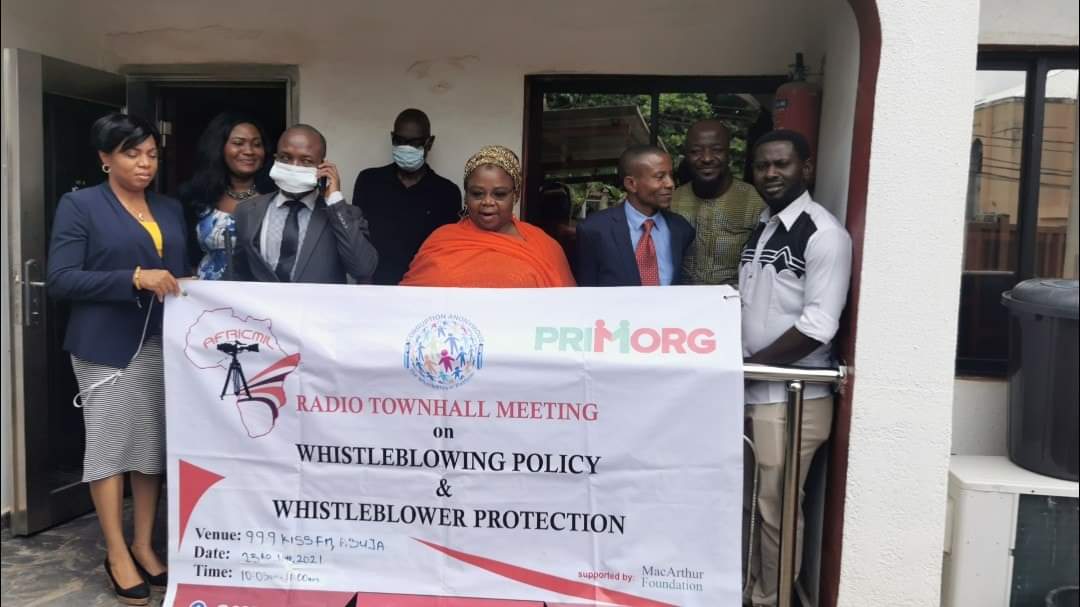By Doyin Ojosipe
Panelists have called on lawyers in the country to join in the anti-graft war by providing pro bono services for embattled whistleblowers.
They gave the charge during a radio program on KISS FM 99.9, Abuja.
The program with the theme, “protection for whistleblowers in the whistleblowing policy: how adequate” was organised by the African Centre for Media and Information Literacy (AFRICMIL) in collaboration with the Progressive Impact Organisation for Community Development (PRIMORG).
Speaking at the event, a senior legal officer at the Open Society Justice Initiative (OSIWA), Maxwell Kadiri, said whistleblowers who are facing harassment or litigation needed to be defended by lawyers on pro bono because they may not be buoyant enough to pay for legal services.
He said, “Lawyers should join in the whistleblowing policy by working pro-bono to protect the whistleblower, because the whistleblower is caught up between the devil and the deep blue sea where they either suffer retaliation or lose their jobs and are just trying to get some economic support. Asking them to engage the services of a lawyer to pay at market rate will further impoverish them.”
Kadiri also emphasized the importance of identity protection for whistleblowers.
Godwin Chigbu, also a lawyer, who called on the federal government to ensure that provision of physical protection for whistleblowers including their families is contained in the much-anticipated whistleblower protection bill, which is on its way to the National Assembly for deliberations.
He said there was the need for the federal government to be more proactive with the whistleblowing policy by penalizing institutions or individuals who were found guilty of leaking tips submitted by whistleblowers.
According to him, “Government should show its seriousness by giving adequate compensation to those who suffer retaliation and also to make sure that there is stiff punishment for those who are meant to implement this policy but who unlawfully disclose either the identity, facts of the tip, and the identity of the whistleblower.”

In the same vein, former secretary of the Nigerian Union of Journalists (NUJ), Federal Capital Territory (FCT) chapter, Rafat Salami, said the most dogged whistleblowers who had never ceased to expose corruption irrespective of the threats they faced daily were journalists.
Salami pointed out that it was important for media owners, the NUJ, and the government to enact laws that would keep journalists out of harm’s way.
“Journalists are being intimidated and harassed virtually all the time. They experience double retaliation. In other climes, there are shield laws but Nigeria does not have such.
“Worst still, even where there are infringements against Journalists, are they investigated, the culprits arrested and prosecuted? That is the impunity to commit crimes against journalists that we have been speaking about which the NUJ has also been advocating against.
“Journalists need several protections. First, it is for the security of his job and then the right to earn a decent living. Many of them are not paid their salaries.

Journalists should be trained on how to protect their sources and on what to look out for in a threat. Some journalists have paid the supreme sacrifice for that.
When a journalist reports a threat to his or her life, it should be taken seriously. If journalists are not protected, people will not blow the whistle; they won’t open up to the journalists, even with minimal protection,” she said.
On his part, Kassim Lawal, a legal practitioner, and the chairman of the Association of Lawyers with Disabilities in Nigeria, FCT Chapter, urged the government to not only focus on the reward of whistleblowers, but also do away with certain laws that easily free convicted corrupt individuals.”
This is the fourth in the series of radio town hall meetings by AFRICMIL on the whistleblowing project tagged Corruption Anonymous, CORA. The project is supported by the MacArthur Foundation.




